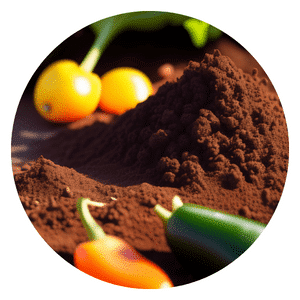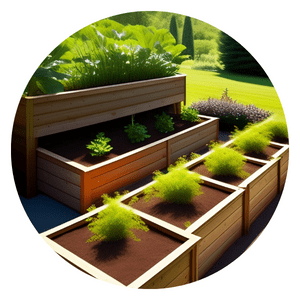How to Germinate Zucchini Seeds Naturally for a Healthy Garden
Growing a healthy and bountiful vegetable garden is one of the most rewarding activities for any home gardener.
Zucchini, or courgettes, are popular and easy to grow vegetables that can provide a delicious harvest when planted during the right season.
Germinating zucchini seeds naturally offers an economical way to get your garden off to a great start.
Zucchini Germination Menu
Preparing for Seed Germination
To prepare for seed germination, it is essential to start with quality seeds.
Look for organic and non-GMO zucchini seeds from a reputable source.
Next, choose the right soil mix that has good drainage and is rich in nutrients.
A common mix for seed starting is a 50/50 blend of peat moss and vermiculite.
Before planting the zucchini seeds, soak them in warm water overnight to help speed up the germination process.
Once soaked, place the seeds in small pots filled with soil mix or directly into prepared garden beds.
Cover the seeds lightly with soil or vermiculite to protect them from drying out.
In order to encourage proper germination, provide consistent moisture by misting regularly or watering gently with a spray bottle until sprouts emerge.
Also, keep the temperature consistently between 70-85°F during this stage by placing pots near windowsills or under grow lights if necessary. With these preparation steps in mind, your zucchini plants will have a healthy start to their growth cycle!
Choose High-Quality Seeds
Using high-quality seeds is essential for growing a healthy and productive garden.
When it comes to germinating zucchini seeds, the quality of the seed plays an important role in determining how well they will grow.
High-quality seeds are genetically pure and have a higher chance of germinating successfully. They also tend to produce stronger plants with better yields.
In contrast, low-quality seeds may be genetically unstable or contaminated with disease-causing organisms that can harm your plants. These seeds may also fail to germinate or produce weak, stunted plants that are more vulnerable to pests and diseases.
By choosing high-quality zucchini seeds, you can ensure that you are starting your garden on the right foot.
To find high-quality zucchini seeds, look for reputable seed companies that specialize in organic or heirloom varieties.
These companies typically offer a wide selection of open-pollinated and non-GMO (genetically modified organism) seeds that are free from synthetic chemicals and pesticides.
You can also check online reviews or ask fellow gardeners for recommendations to help you make an informed choice.
Start Seeds Indoors
Starting zucchini seeds indoors can be a great way to give them a head start on the growing season.
Indoor seed starting provides a controlled environment that is ideal for germinating zucchini seeds, as it allows you to control temperature, moisture and light levels. This ensures that your plants have the best possible conditions for growth.
By starting your zucchini seeds indoors, you can plant them outside earlier in the spring when temperatures are more favorable for growth. This means you can harvest your zucchinis sooner and enjoy fresh produce from your garden earlier in the year.
In addition to an extended growing season, indoor seed starting also reduces the risk of pests and diseases that can affect young plants when they are grown outside from seed.
Overall, if you want to get a jump start on your gardening season and ensure healthy plants, starting zucchini seeds indoors is definitely worth considering.
With a little bit of effort and attention, you will have strong seedlings ready for transplanting into the garden once all danger of frost has passed.
To grow a zucchini, to reap the reward It's time to germinate that special seed Fill a container with warm, moist soil Be sure not to plant too deep or your garden will wilt and yield nothing fruitful at all In two or three weeks you can expect it to sprout Sun is needed for growth, of this there's no doubt Water often and watch it flourish with glee Your bounty from nature you shall soon see!
Chappy The Gardener
Use the Right Soil
The ideal soil conditions for zucchini seed germination are well-drained, nutrient-rich soil with a pH level between 6.0 to 7.5.
Zucchinis grow best in loose, friable soil that contains plenty of organic matter and is free from stones or other debris that could hinder root growth or drainage.
To achieve these optimal soil conditions, start by preparing your garden bed by tilling the earth to a depth of at least six inches and working in compost, aged manure or another rich organic amendment.
Once you have loosened the soil and added plenty of organic material, rake it over to create a smooth surface for planting your zucchini seeds.
Next, make shallow trenches about an inch deep in the prepared soil at intervals of three feet apart across the bed.
Then place two to three seeds into each trench and cover them with about half an inch of soil.
Finally, water gently but thoroughly so that the soil is moist but not soggy.
Keep the area consistently damp until seedlings emerge in seven to ten days’ time, then gradually reduce watering frequency as plants mature and develop stronger root systems.
With careful attention paid to creating proper growing conditions from the outset, you can ensure healthy zucchini plants that produce abundant fruit throughout their growing season!
Keep Soil Moist
When germinating zucchini seeds, it’s crucial to keep the soil moist for successful growth.
The moisture provides a healthy environment for the seed to sprout and develop roots.
However, too much water can drown the seeds and prevent them from growing altogether.
To avoid this, start by watering the soil before planting the seeds. Make sure that it is evenly moist but not soaked.
During germination, you need to monitor the soil daily and water as needed.
A spray bottle can help you maintain an even moisture level without overwatering or disturbing the seeds’ placement. If you notice any dryness on top of the soil, add a small amount of water until it’s damp again.
Moreover, covering your container with plastic wrap or using a seedling tray with a humidity dome helps retain moisture in the air around your plants while they grow.
Remember to remove coverings once sprouts appear above ground to ensure proper airflow and sunlight exposure for healthy development as well!
Germinating Zucchini Seeds
Zucchini is a popular summer squash grown in many home gardens.
zucchini seeds is fairly simple and can be done naturally with just water and soil.
One way to germinate zucchini seeds is to start them indoors about 4-6 weeks before the last expected frost date in your area.
Fill a seed tray or container with potting mix, make small holes about 1 inch deep, and place one seed in each hole.
Cover the holes with soil, mist with water, and keep the soil moist until the seeds sprout.
Another way to germinate zucchini seeds naturally is by planting them directly into your garden bed after all danger of frost has passed.
Choose a sunny spot with well-draining soil and add compost or organic matter if needed.
Make rows about 1 inch deep and plant each seed about 2-3 inches apart.
Cover the seeds with soil, water gently but thoroughly, and keep the soil moist until they germinate.
Once your zucchini plants have sprouted, thin them out so that they are spaced about 18-24 inches apart to give them room to grow and produce healthy fruits throughout the summer season.
Plant the Seeds
When planting zucchini seeds, it’s important to plant them at the right depth and spacing for optimal growth.
Begin by preparing the soil in a well-drained area with plenty of organic matter.
Zucchini plants require full sun and warm soil temperatures.
To plant the seeds, create small holes in the soil with a finger or small tool about 1 inch deep.
Place one seed in each hole and cover with soil.
Space each hole about 2-3 feet apart to allow for proper growth and airflow.
Once planted, water the area thoroughly but gently to avoid disturbing the seeds.
Be patient as zucchini seeds can take up to two weeks to germinate naturally.
With proper care and attention, you can enjoy an abundant harvest of fresh zucchinis straight from your garden!
Provide Adequate Light
Providing adequate light is crucial for healthy seedling growth.
When growing zucchini seeds indoors, it’s important to provide them with enough light to promote strong root and stem development.
Insufficient lighting can cause the seedlings to become weak and leggy, making them more susceptible to disease.
To ensure that your zucchini seeds receive enough light, place them near a south-facing window where they will receive at least 6 hours of direct sunlight per day.
Alternatively, you can use grow lights to create a more controlled environment with consistent light levels.
When using grow lights, position them so that they are about 2-4 inches above the top of the seedlings. This will provide them with enough light without causing heat stress or burning their leaves.
With proper lighting, your zucchini seeds will germinate quickly and develop into healthy plants ready for transplanting into your garden space.
Keep the Environment Warm
Maintaining a warm and stable environment is crucial for the successful germination of zucchini seeds.
One effective way to achieve this is by using heat mats or other heating devices.
These mats provide a consistent source of warmth that will help keep the soil temperature constant, which in turn encourages the seeds to sprout.
To use a heat mat, simply place it under your seed tray or container before sowing your zucchini seeds.
Make sure to monitor the temperature regularly with a thermometer, as overheating can harm the seeds.
Another option is to cover your seed tray with plastic wrap or a clear lid, which will trap heat and create a greenhouse effect.
In addition to heating devices, it’s important to choose an appropriate location for germinating your zucchini seeds. Look for an area that receives plenty of sunlight and has good air circulation.
Avoid placing your seeds in drafty areas or near windows where they may be exposed to cold temperatures at night.
By following these tips, you can create an ideal environment for healthy zucchini seed germination and ensure a bountiful harvest later on!
Transplanting Seedlings
The best time to transplant zucchini seedlings is after they have grown two to three true leaves. This usually takes about four weeks from the day of germination.
The soil should be moist enough so that the roots can be easily taken out without breaking any of them.
Carefully loosen up the soil around each seedling, and gently lift them out with a spoon or a small gardening tool. Be sure not to damage the delicate roots.
When transplanting, make sure you place each seedling in a hole deep enough for their root system while keeping their stem level with the ground surface.
Add water immediately after planting, and keep watering regularly until they are well established in their new location. It’s important to remember not to overcrowd your zucchini plants as this may affect their growth and production.
Transplanting zucchini seedlings can be done successfully if it is done at the right time and with great care for the plant’s delicate root system.
By following these simple steps, you will ensure that your zucchinis grow healthy and strong throughout the season!
In conclusion, germinating zucchini seeds naturally can be a great way to ensure healthy growth and a successful garden.
From selecting the perfect variety, to providing adequate water and light, the steps provided will help you get started with the process.
With some patience and careful tending, you can begin cultivating your own zucchini plants in no time.
Don’t forget to harden off your seedlings before transplanting them into the garden and keep an eye out for pests or disease that may arise.
Click To Grow
Helps Us Grow – Share If You Like
















